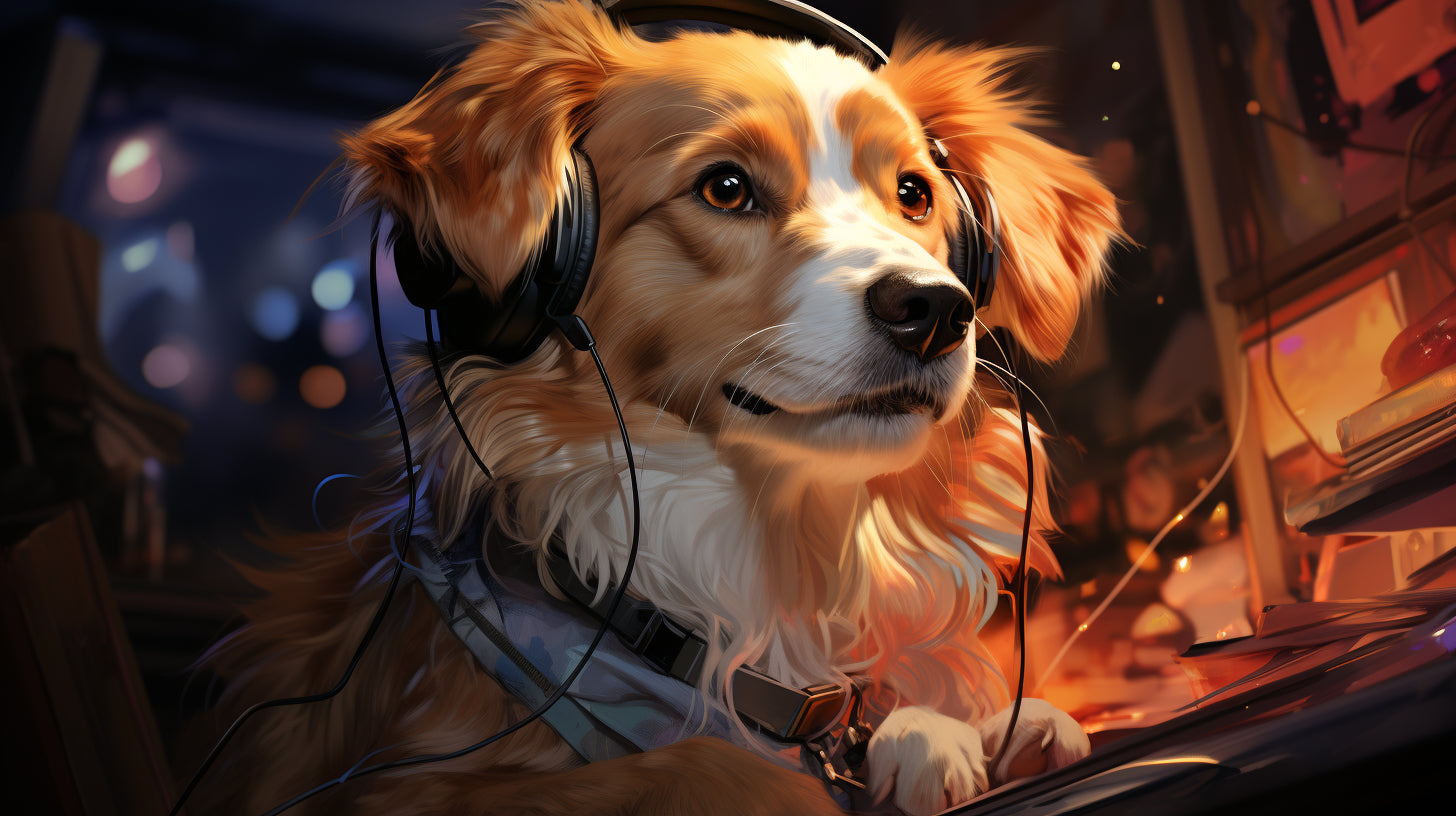In the rapidly evolving world of pet care, one issue continues to gain increasing attention and importance - pet anxiety. Just as humans can feel the weight of stress and anxiety, our beloved furry companions can, too. And as pet parents become more in tune with the emotional well-being of their pets, the drive for innovative solutions for alleviating pet anxiety sharpens. This need has breathed life into the fast-growing market of pet anxiety relief solutions, ushering in a new wave of advancements that are set to redefine how we support our pets in their times of need.
This article journeys down the intriguing path of the pet anxiety relief sector's future. It explores the current market size and growth, the impact of pet ownership on human mental health, the rising prevalence of pet anxiety, established and emerging methods for alleviating pet anxiety, and predictions about what new innovations 2023 might bring in the realm of pet anxiety relief. Strap in and get ready to delve into this pivotal aspect of pet care, as understanding it could make a world of difference in how you care for your fluffy loved ones. Whether you're a pet parent or a pet industry enthusiast, this read promises pertinent insights into how pet anxiety relief is shaping the future of pet care.
Current Market Size and Growth
As any pet parent knows, our furry friends don't just bring endless joy and companionship; they also have their unique needs and challenges. And the one challenge that's taking center stage in pet parenting is pet anxiety, resulting in a burgeoning pet anxiety products market.
Global Pet Noise Anxiety Market
Did you know that the Global Pet Noise Anxiety Market, which encompasses a wide range of products designed to calm pets during noisy situations like thunderstorms and fireworks, was sized at an impressive USD 148.28 million in 2022? This niche market is not just big, it's thriving. It's experienced a compound annual growth rate (CAGR) of 8.03%.
This means that there's not only a significant demand for products that help pets cope with noise anxiety, but also that this demand is growing steadily. Pet parents worldwide are investing more and more in the mental well-being of their companions.
Dog Stress and Anxiety Product Market
If you think the numbers for pet noise anxiety market are impressive, just wait until you hear about dog stress and anxiety product market estimations. Experts believe this market sector is set to reach the multimillion USD echelon by 2030.
Considering dogs are one of the most popular pets worldwide, this projection shouldn't come as a surprise. Owners are more attuned to the emotional needs of their four-legged buddies and will spare no expense to ensure their canine comrades are calm and happy.
US Pet Industry Growth
The US, in particular, has shown an extraordinary inclination towards prioritizing pet wellness. The pandemic years illuminated the phenomenal potential of this industry. In 2020, the pet industry's sales saw an uptick of 9.8%, only to be beaten by a whopping 13.7% increase in 2021.
These numbers clearly highlight the US consumer's commitment to providing the best care and products for their pets, contributing to the overall growth of the pet industry.
In a nutshell, the pet anxiety and stress product market has an encouraging future. As our understanding and empathy for pet anxieties grow, so will the industries catering to these needs. For pet parents and industry stakeholders, this bodes well, promising a future where every pet receives the care and comfort they deserve.
Impact of Pet Ownership on Human Mental Health
Take a moment to think about your favorite pet — your loyal canine companion who wags his tail at the mere mention of your name, or your cozy feline friend who can always find the warmest spot in the house. How does the image of their trusting eyes or the sound of their content purring make you feel?
In a world where human connections can sometimes be demanding, the relationship between humans and their pets is a unique emotional anchor. This bond, which might be seen as trivial by some, has significant implications for human mental health. Let's take a closer look at how our little furry, feathery, or scaly friends can transform our lives.
First off, the simple act of petting an animal can elevate our mood. It triggers the release of hormones such as oxytocin, dopamine, and serotonin, which are associated with joy and relaxation. The presence of a pet can also lower our levels of stress-related hormones like cortisol.
Moreover, pets can help to alleviate feelings of loneliness and isolation. A pet's constant companionship can provide emotional support in demanding times. Their undemanding affection and unconditional love inspire a sense of well-being and emotional stability. This is especially significant given the increased mental health concerns in the current pandemic era.
Now, here's an interesting statistic to underline this point: a whopping 74% of pet owners reported improvement in their mental health after welcoming a pet into their lives. This compelling figure shows how boosting mental health isn't merely a pleasant side effect of pet ownership – it’s a very real phenomenon supported by concrete evidence.
Pets also teach us the virtues of patience, responsibility, and empathy. Taking care of an animal's needs makes us more aware of our effect on others. It nurtures compassion and understanding, which can extend to our interaction with fellow humans as well.
Examples of the therapeutic power of pets are abundant. From autism to depression, trained therapy animals have been making substantial differences. Programs incorporating animal-assisted therapy in hospitals, prisons, and schools are not just trendy, they're backed by years of rigorous scientific research.
Let's not forget elderly pet owners who reap mental health benefits too. The companionship of a pet can have a profound positive impact, often reducing feelings of isolation, providing needed physical activity, and overall contributing to an improved quality of life.
To sum it up, the 'pawsitive' influence of our pet companions on our mental health can't be overstated. From alleviating loneliness to enabling empathy and improving emotional well-being, the magic of pet ownership bears a real bearing on mental health. Their love-as-nature-intended offers a warm solace, a calming restorative experience in an ever-demanding world. Embrace the joy and companionship that our animal friends bring into our lives today.
Increasing Prevalence of Pet Anxiety
In recent years, pet owners worldwide have noticed a surprising trend. Their four-legged friends seem to develop unsettling symptoms remarkably similar to human anxiety. The phenomenon, dubbed "pet anxiety," has become so prominent that it's worth examining its causes, manifestations, and solutions.
But why now? What factors triggered this sudden rise in our pet's stress levels? Most experts suggest it's linked with dramatic lifestyle changes that imposed by the COVID-19 pandemic. As their humans started spending more moments at home (and then suddenly less), dogs and cats found their routines and environments drastically unsettled. This abrupt shift, it appears, played a significant role in triggering anxiety in pets, especially dogs.
Dog Separation Anxiety
A particular subset of this trend lies in dog separation anxiety. Figures show an alarming increase of over 700% in dog separation anxiety cases in the past two years since the pandemic started. Many beloved pets have been struggling with their owners' absence, showcasing symptoms like persistent barking, destructive behavior, house soiling, and in extreme cases, self-harm.
Dog owners have taken note of this disturbing pattern, reporting that they spend an additional $400 per year on their pet's care. Such expenditure includes frequent vet visits, anti-anxiety medications, and dog calming treats. These figures underscore the severity of the situation and hint at the emotional toll it's causing our furry friends.
Taking all this into account, it's clear that pet anxiety, especially dog separation anxiety, is neither an exaggerated concern nor an isolated incident. It's a serious problem triggered by the current global scenario that's impacting millions of households.
By understanding the signs and being proactive with routine adjustments or medical care when needed, we can help our pets manage their anxiety and ensure they feel secure even in uncertain times. After all, as pet parents, their happiness and well-being is in our hands, pandemic or not.
Methods for Alleviating Pet Anxiety
Imagine this, it's time for your annual summer family vacation, and you notice your furry friend pacing around, whimpering, and panting excessively as you prepare to leave. You can tell something's not right but you can't seem to put your finger on the button. Well, these are common signs of anxiety in pets. In fact, it's not only humans who experience bouts of anxiety; our pets are equally susceptible. Anxiety can make your pet's life a living nightmare. So how do you help your furry friend navigate these moments of uncertainty? Let's dive in and explore some effective methods for alleviating pet anxiety.
Exercise and Mental Stimulation
Much like us humans, our pets need regular exercise and mental enrichment to keep their anxiety levels low. An idle mind can often lead to an anxious one, so ensuring your pet receives the correct amount of both physical and mental stimulation is key. Try introducing puzzle toys or training exercises into their daily routine to keep your pet engaged and active.
CBD Products Market
In this age of wellness, the popularity of CBD, a hemp-derived product, is soaring. It's estimated that the market for CBD products for pet anxiety is likely to reach $1.16 billion in the US alone by 2022. Why? Simply because CBD has been found to have calming effects on pets, and can work wonders for those suffering from anxiety. However, before resorting to CBD, it's advisable to consult with your vet.
Medication Treatments
Just like humans, pets can benefit from medication treatments as well. However, this is usually considered the last resort after behavior modification strategies and natural remedies have proven ineffective. Always remember to use medication as directed by a veterinarian to avoid any potential side effects.
Supplements and Pheromones
Sometimes, anxiety can be tamed using calming supplements and pheromones. This method employs certain substances known to soothe pet anxiety. Such substances tap into the nervous system, reducing the overall activation, hence, calming your pet.
Socialization and Exposure
Proper socialization and exposing pets to a variety of experiences can help prevent anxiety. It's important to gradually introduce your pet to new people, environments, and other animals to minimize fear buildup.
Pet Therapy
And finally, pet interaction therapies or pet therapy have shown positive results in reducing anxiety. Tending to animals can enhance feelings of relaxation and happiness, therefore reducing moments of anxiety.
Anxiety can compromise your pet's overall quality of life, making it a pressing issue that needs immediate attention. Thankfully, there are numerous ways to alleviate pet anxiety, ensuring that your pet is happy, calm, and contented. While it might take time to figure out which method works best for your pet, rest assured that there's a solution out there that will make all the difference!
Specific Pet Anxiety Situations
Some call them man's best friend, woman's lifelong companion or even the devilishly cute minions that rule our homes. Yes, we're talking about pets! Whether it's a dog, a cat, a goldfish, or even a feisty little ferret, our pets become an indispensable part of our lives. However, like us, our furry or finned companions can also struggle with anxiety. In some specific situations, such as fireworks, this anxiety can escalate into full-blown fear.
Firework Anxiety
Fireworks, while a cause for celebration for many of us, are a nightmare for our pets. The sudden, loud noises can trigger intense fear reactions, causing our usually cheerful buddies to resort to hiding or display other distress indications.
You might have noticed it - the trembling body, the wide-eyed fear or the constant whining. And it breaks your heart as much as it scares your pet. Thankfully, there are ways to help our pets through these stressful times.
Firework anxiety in pets can be eased with the help of anxiety medication prescribed by a trusted vet. It's always best to consult a professional before giving any medication to your pet. There's the widely popular ThunderShirt, that works on the principle of applying gentle, constant pressure to calm pets, much like how swaddling works for babies. Then, believe it or not, there are 'dance parties'. Yes, as odd as it may sound, organise a dance party at your place. Pump up the volume of the music (ideally, of a genre your pet likes) to muffle the sound of the fireworks, and dance the night away. Animals are highly perceptive, and your calm, joyful state can help them feel at ease.
Different Treatment Methods
Of course, firework anxiety is just one specific situation. Pet anxiety can manifest in countless other ways and situations—separation anxiety, social anxiety, specific fears like those of vets or vacuum cleaners, the list goes on. Luckily, the options for treating these anxieties are just as numerous.
Different methods of dog anxiety treatment include medication, behavior therapy, and the use of calming products. Medication can help in cases of severe, chronic anxiety. Veterinary behaviour therapists can guide pet parents in helping their pet overcome their anxieties using effective and compassionate training methods. Then there are calming products like anxiety wraps, pheromone diffusers, calming treats and toys, and even music designed to soothe the anxious animal mind.
Whatever the cause for your pet's anxiety, remember these key points:
- Always approach your pet with kindness and understanding.
- A sudden change in behaviour often indicates stress or anxiety.
- Seek professional help if you're unsure about what to do.
- Most importantly, never downplay your pet's anxiety.
Recognising and addressing pet anxiety not only improves the quality of life for our pets but strengthens the bond we share with them. So, let's aim to create a world where our pets lead happier, healthier, and more relaxed lives!
Conclusion
As we breach into 2023, addressing pet anxiety is not just about the well-being of our furry friends. It’s a responsibility that intertwines with our own mental health as well. Science has shown how stress and anxiety can be shared between pet and owner, thus the urgency to alleviate our pets' discomforts becomes folded into our own needs for tranquility.
But the path forward is brighter than ever before; innovations are on the rise and the pet product industry continues to grow, creating avenues for more effective treatments. Whilst there are a multitude of methods available, choosing the right option for your pet can feel overwhelming.
At Empowered by Ashley, we understand the mutual well-being of pet and pet owner. Our range of products, designed with the highest regard for quality, inclusion, and customer satisfaction, seeks to alleviate pet anxiety as well as empower the individual pet owner. As we continue innovating for the future, rest assured that we are committed to supporting you at each step of your journey towards a healthier, safer, and happier life with your pets. Afterall, their well-being is our priority; helping them, helps us all.
Frequently Asked Questions
-
What are the common symptoms of pet anxiety?
Common symptoms of pet anxiety include excessive barking, panting, restlessness, aggression, destructive behavior, loss of appetite, excessive drooling, and trembling.
-
How can pet anxiety be treated?
Pet anxiety can be treated through various methods, including behavior modification techniques, desensitization training, the use of natural remedies, such as CBD oil or herbal supplements, and in severe cases, with the help of prescription medications prescribed by a veterinarian.
-
What are some innovative solutions for pet anxiety relief?
Innovative solutions for pet anxiety relief include the use of interactive toys and puzzle feeders to keep pets mentally stimulated, virtual reality therapy tailored for pets, wearable anxiety monitoring devices, and the development of customized anxiety relief programs designed specifically for individual pets.
-
Are there any advancements in pet anxiety relief expected by 2023?
There are several advancements expected in pet anxiety relief by 2023. These include the development of more effective and safe medications for pet anxiety, increased use of virtual reality therapy, and the introduction of advanced wearable devices for real-time anxiety monitoring and management.
-
Can pet anxiety be completely cured?
While pet anxiety can be managed and reduced, it may not be completely cured in some cases. The best approach is to identify triggers, provide a supportive environment, and use a combination of behavioral techniques, natural remedies, and, if necessary, medication to help the pet cope with their anxiety.
















Leave a comment
This site is protected by hCaptcha and the hCaptcha Privacy Policy and Terms of Service apply.